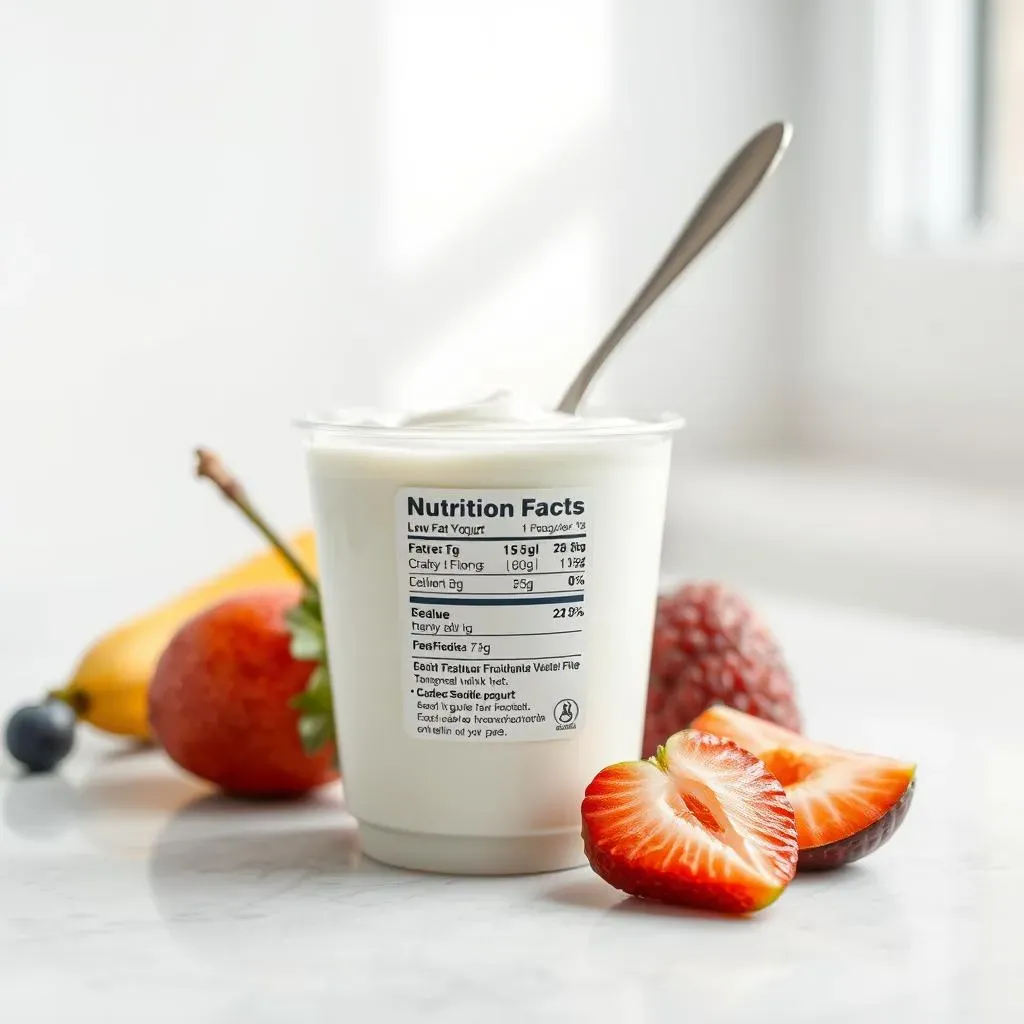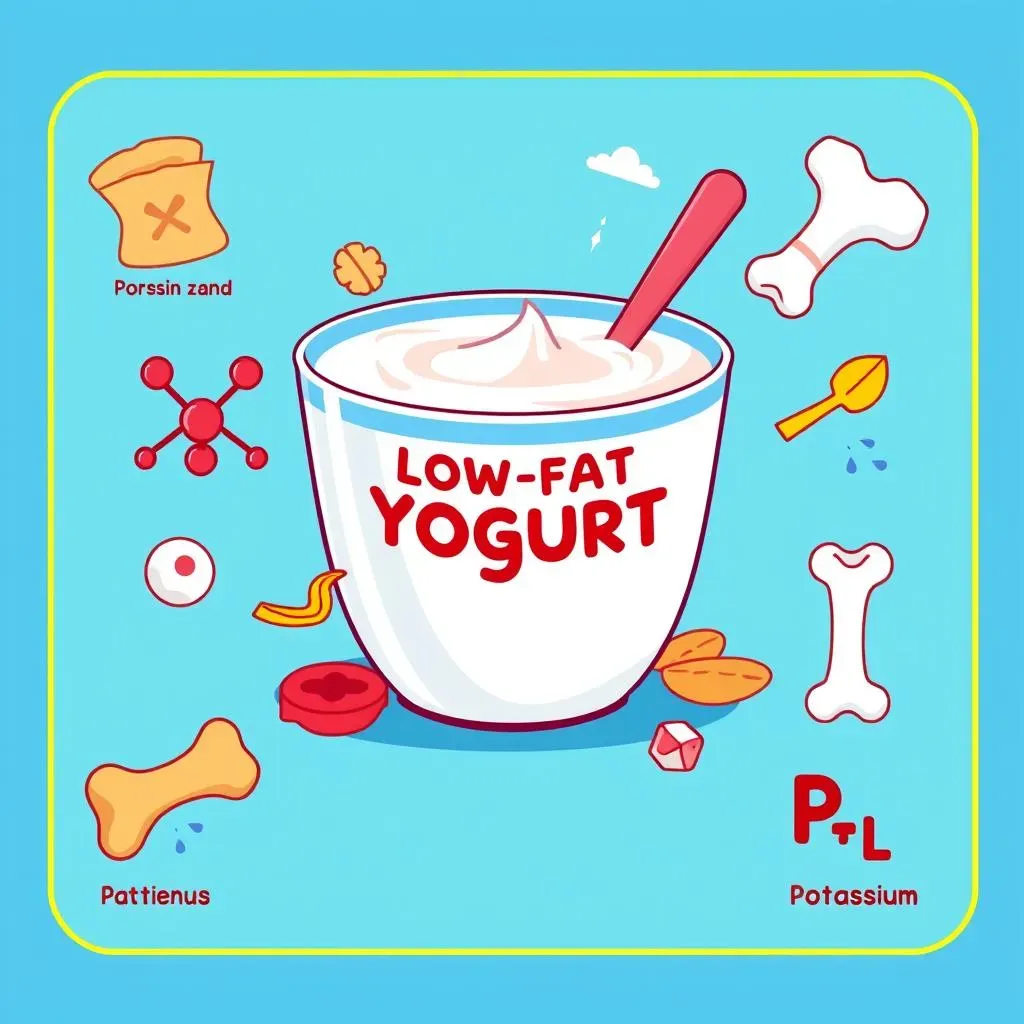Table of Contents
Are you curious about the nutritional powerhouse that is low-fat yogurt? This article is your guide to understanding the ins and outs of low fat yogurt nutrition. We'll explore the calorie and macronutrient content, highlighting the essential vitamins and minerals packed into each serving. Discover how low fat yogurt contributes to a healthy gut, aids in weight management, and offers a range of other potential health benefits. We'll also equip you with the knowledge to navigate grocery store shelves confidently, helping you choose the best low-fat yogurt options to meet your individual needs and preferences. Get ready to unlock the secrets of low fat yogurt nutrition and make informed choices for a healthier you! Prepare to be surprised by what this seemingly simple food can do for your wellbeing. Let's dive in!
Low Fat Yogurt Nutrition: A Calorie and Macro Breakdown

Low Fat Yogurt Nutrition: A Calorie and Macro Breakdown
Understanding Calorie Content
Let's face it, calories are a big deal for many people. One of the first things we look at when choosing a food is the calorie count. Low-fat yogurt is a surprisingly versatile option, offering a range of calorie counts depending on the brand, serving size, and added ingredients. A typical 1-cup serving of plain, low-fat yogurt might clock in around 100-150 calories. This makes it a great snack or meal component for those watching their weight. However, flavored varieties or those with added fruits or sweeteners can significantly increase the calorie count, sometimes doubling it. So, always check the nutrition label!
Remember, a calorie isn't just a calorie. The source of those calories matters. Low-fat yogurt provides valuable nutrients alongside its calories, unlike many processed snacks that are calorie-dense but nutrient-poor. This is why focusing solely on calorie restriction isn't always the best strategy. A balanced diet that includes nutrient-rich foods like low-fat yogurt is far more effective for long-term health and weight management.
Yogurt Type | Approximate Calories (per 1 cup) |
|---|---|
Plain, Low-Fat | 120-150 |
Flavored, Low-Fat | 150-200+ |
Greek, Low-Fat | 150-180 |
Macronutrient Profile: Protein, Carbs, and Fat
Beyond calories, the macronutrient breakdown of low-fat yogurt is crucial. Low-fat yogurt is a decent source of protein, which is essential for building and repairing tissues, keeping you feeling full, and supporting a healthy metabolism. The protein content can vary, but you can typically expect around 10-15 grams of protein per cup. This makes it a valuable addition to a balanced diet, especially for those who are active or trying to build muscle.
Carbohydrates are another key component, primarily in the form of lactose (milk sugar). While carbs provide energy, it's important to be mindful of the added sugars often found in flavored yogurts. These added sugars can quickly bump up the calorie count and negatively impact your blood sugar levels. Opt for plain, unsweetened varieties to keep your carb intake healthier and better controlled. Finally, the "low-fat" designation indicates a reduced fat content compared to full-fat options. While fat is important for certain bodily functions, choosing low-fat yogurt can help reduce overall fat intake if that's a dietary goal.
- Protein: Essential for muscle growth and repair
- Carbohydrates: Provide energy, but watch for added sugars
- Fat: Reduced in low-fat varieties
Essential Nutrients in Low Fat Yogurt: Protein, Calcium, and More

Essential Nutrients in Low Fat Yogurt: Protein, Calcium, and More
Protein Powerhouse
Let's talk protein! We already touched on it in the calorie and macro breakdown, but it deserves its own spotlight. Low-fat yogurt is a surprisingly good source of protein, and that's fantastic news for your body. Protein is the building block for muscles, keeps you feeling full and satisfied, and helps regulate your metabolism. Think of it like the mortar holding your body's bricks together. A single cup can provide a solid dose of protein, contributing to your daily needs without a lot of extra calories.
Different types of yogurt offer different protein levels. Greek yogurt, for example, is often touted for its higher protein content compared to regular yogurt. However, even regular low-fat yogurt can offer a decent amount, making it a versatile protein source that fits into various diets and lifestyles. Just remember to check the nutrition label to compare protein amounts between brands and types.
Yogurt Type | Approximate Protein (grams per 1 cup) |
|---|---|
Plain, Low-Fat | 10-12 |
Flavored, Low-Fat | 8-10 |
Greek, Low-Fat | 15-20 |
Calcium and Beyond: A Mineral Marvel
Beyond protein, low-fat yogurt is a fantastic source of calcium, a crucial mineral for healthy bones and teeth. Calcium is like the steel in a building's framework, providing strength and support. Many people don't get enough calcium in their diets, making low-fat yogurt a convenient and tasty way to boost your intake. It's particularly important for growing children and adults looking to maintain strong bones as they age. This is where low-fat yogurt truly shines as a nutritional champion!
But the mineral benefits don't stop at calcium. Low-fat yogurt also contains other essential minerals, such as potassium and phosphorus, which contribute to various bodily functions, from nerve impulses to energy production. These minerals work together like a well-oiled machine, keeping everything running smoothly. While the amounts might not be as high as in some other foods, the combined contribution from all these minerals makes low-fat yogurt a valuable part of a balanced diet.
- Calcium: Essential for strong bones and teeth
- Potassium: Supports healthy blood pressure
- Phosphorus: Crucial for energy production and cell function
Low Fat Yogurt Nutrition and Health Benefits: Gut Health, Weight Management, and Beyond

Low Fat Yogurt Nutrition and Health Benefits: Gut Health, Weight Management, and Beyond
Gut Health: A Happy Tummy, A Happy You
Let's talk about your gut—that amazing ecosystem of bacteria living inside you. Low-fat yogurt, especially varieties with live and active cultures (look for the label!), can be a real friend to your gut microbiome. These beneficial bacteria, often called probiotics, help maintain a healthy balance in your gut, aiding digestion and potentially boosting your immune system. Think of it as a tiny army of helpful microbes working hard to keep you healthy.
A healthy gut is linked to a number of health benefits, from improved digestion and nutrient absorption to a stronger immune response. While more research is needed to fully understand the extent of these benefits, the evidence so far suggests that incorporating probiotics like those found in low-fat yogurt into your diet can contribute to a healthier gut and overall wellbeing. It's like giving your internal ecosystem a little boost.
Benefit | How Low-Fat Yogurt Helps |
|---|---|
Improved Digestion | Probiotics aid in breaking down food |
Boosted Immunity | Supports a healthy gut microbiome |
Nutrient Absorption | Helps your body absorb nutrients more efficiently |
Weight Management: A Helpful Ally
Maintaining a healthy weight is a common goal for many, and low-fat yogurt can be a valuable tool in your weight management journey. Its high protein content helps keep you feeling full and satisfied, reducing cravings and preventing overeating. This satiety effect is incredibly helpful when you're trying to manage your calorie intake. Think of it as a natural appetite suppressant, helping you stay on track with your weight goals.
Moreover, the lower fat content compared to full-fat options contributes to a reduced overall fat intake, which can be beneficial for weight management. However, remember that portion control is crucial. Even healthy foods can contribute to weight gain if consumed in excess. Pairing low-fat yogurt with a balanced diet and regular exercise is the key to long-term success.
- High Protein: Keeps you feeling full
- Lower Fat: Reduces overall fat intake
- Versatile: Can be incorporated into many meals and snacks
Choosing the Right Low Fat Yogurt: Navigating Labels and Making Informed Decisions

Choosing the Right Low Fat Yogurt: Navigating Labels and Making Informed Decisions
Decoding the Nutrition Label: What to Look For
So, you're standing in the yogurt aisle, overwhelmed by choices. Don't panic! The key is knowing what to look for on the nutrition label. First, check the serving size – it's usually one cup, but some containers might be different. Then, focus on the macronutrients: protein, carbs, and fat. Aim for a yogurt with a decent amount of protein (at least 10 grams per serving) and relatively low added sugars. Remember, "low-fat" doesn't always mean "no sugar," so check those added sugars carefully!
Pay attention to the ingredients list as well. Avoid yogurts with a long list of artificial ingredients, preservatives, or excessive sweeteners. Look for simpler ingredients, like milk, live and active cultures (probiotics!), and maybe some fruit. If you're sensitive to certain ingredients, checking the label is your best defense against unexpected reactions. Reading the label isn't just about the numbers; it's about understanding what you're actually putting into your body.
Label Component | What to Look For |
|---|---|
Serving Size | Usually 1 cup, but check carefully |
Protein | Aim for at least 10 grams per serving |
Added Sugars | Keep it as low as possible |
Ingredients | Simple ingredients list is best |
Beyond the Basics: Exploring Yogurt Types and Variations
Not all yogurts are created equal. Beyond the standard low-fat variety, you'll find Greek yogurt, which packs more protein, and even non-dairy options made from soy, almond, or coconut milk. Greek yogurt is a protein powerhouse, offering a thicker texture and a tangier flavor. Non-dairy alternatives provide a great option for those with lactose intolerance or following a vegan lifestyle. However, be sure to check the nutrition label because the calorie and macronutrient content can vary significantly between these different types.
Consider your personal preferences and dietary needs when choosing. If you're looking for a protein boost, Greek yogurt might be your best bet. If you're lactose-intolerant, explore non-dairy options. If you're watching your sugar intake, prioritize plain, unsweetened yogurts. Ultimately, the "best" yogurt is the one you'll enjoy and stick with as part of a healthy eating pattern. Experiment, find your favorites, and make it a regular part of your diet.
- Greek Yogurt: Higher protein, thicker texture
- Non-Dairy Yogurt: Lactose-free options
- Plain Unsweetened Yogurt: Lower in added sugars
Making Informed Choices: Putting it All Together
Choosing the right low-fat yogurt involves a combination of understanding nutrition labels, exploring different types, and considering your personal preferences. Don't be afraid to experiment! Try different brands and flavors to find what you enjoy. Remember that a balanced diet is key, and low-fat yogurt can be a delicious and nutritious part of it. It's not just about the numbers on the label; it's about choosing a food that supports your overall health and well-being.
Ultimately, the goal is to make informed choices that align with your dietary goals and preferences. Low-fat yogurt offers a wide range of options, so take your time, explore the different brands and flavors, and find the perfect fit for your lifestyle. With a little knowledge and attention to detail, you can easily navigate the yogurt aisle and select a nutritious and delicious option that contributes positively to your health.
